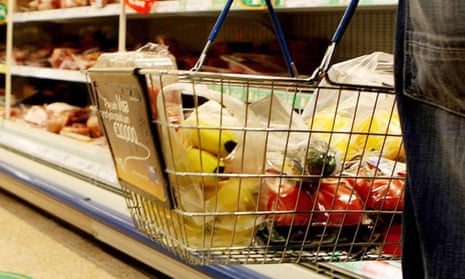Supermarket inflation hit 8.3% in the past month, the highest rate in 13 years, adding £380 to annual bills as the rising cost of living weighs on families.
Sales fell at all the big supermarkets as shoppers switched to discounters Aldi and Lidl and bought more own-label goods in an effort to keep a lid on spending, according to the latest data from Kantar.
Sales of supermarkets’ cheapest own-label products rose 12% while Aldi and Lidl’s sales rose by 7.9% and 9.5% respectively in the three months to 12 June. Aldi’s share of the grocery market is 9.6%, less than 1% behind Morrisons where sales fell by 7.2% in the three-month period making it the biggest loser in the market.
Fraser McKevitt, the head of retail and consumer insight at Kantar, said: “The inflation number makes for difficult reading and shoppers will be watching budgets closely as the cost of living crisis takes its toll.
“Based on our latest data, the average annual grocery bill is on course to rise by £380. This is over £100 more than the number we reported in April this year, showing just how sharp price increases have been recently and the impact inflation is having on the sector.”
He said prices were rising fastest in dog food, butter and milk, while the price of spirits was falling.
The latest evidence of rising inflation comes after the UK’s grocery trade body said price rises in the UK could hit 15% this summer – the highest level in more than 20 years. High inflation could last into the middle of next year, according to its report published last week.
Food price inflation is being fuelled by the war in Ukraine, which is a key grain and oil seed producer. Disruption to exports from the country as well as sanctions on Russia, which is a big grain and petrochemical exporter, as well as Covid-related production lockdowns in China and export bans on key food stuffs such as palm oil from Indonesia and wheat from India.
Despite the money-saving trend, families splashed out during the platinum jubilee celebrations, buying a third more alcohol and 35% more ice-cream than during an average week, according to Kantar. Sales of lemon curd were also up 16% as many people had a go at making the official jubilee trifle.
